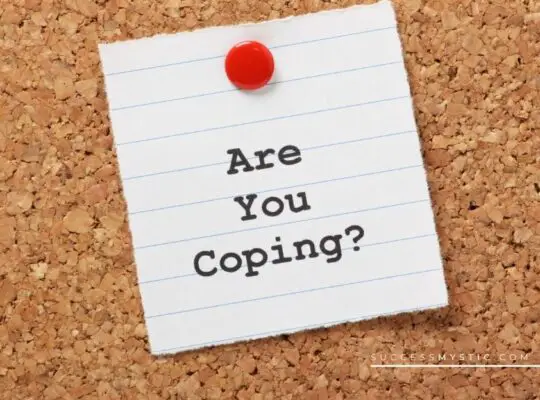It’s become an omnipresent term, so much so it, like most things, has been warped beyond all meaning. That’s what happens when capitalism gets involved and marketers take it too far. At its very core, self-care is about stepping away from the stress and responsibility of your day-to-day to ensure you have what you need to successfully complete the day. Whether it’s your body, heart, brain, or soul that needs the care, it is nourishing.
A solid self-care routine is one you can turn to, to relieve stress when you are dealing with chaos. It’s a set of your favorite activities you can fall back on when you are having trouble getting started. It’s as simple as a face mask and painting your nails or talking to your friend over coffee.
What marketers have done is push the idea that self-care means you have to go to a spa for a luxurious massage. Or you could invest in a home massager and flip it on whenever you need it. But real self-care doesn’t have to cost any money at all. And if you find yourself unable to take joy from old self-care habits or things you normally enjoy, then you are in serious need of deep self-care.
Stress relief should be the foundation of any self-care activity you choose to practice, whether it’s reading, writing, watching television, or taking a bubble bath. While acute stress is good for you in certain situations, being plagued by chronic stress isn’t good for your mental or physical health.
So, practicing self-care is much like taking vitamin D during dark, wintery weather. Self-care isn’t a one-and-done situation, it’s an ongoing process, and the more consistent you are in your practice, the better equipped you are to deal with whatever life might throw at you.
You might like: How self care can manifest abundance
The Necessity Of Self-Care
First things first, you need to stop thinking about self-care as a luxury. It isn’t a selfish act unless you’re taking food from your children’s mouths to go to a spa for the seventh time this month.
Self-care is the act of protecting yourself from burnout by taking care of your physical and emotional needs. If you don’t take care of yourself, all of that stress and anxiety will catch up with you.
It’s impossible to look after everyone else if you can’t look after yourself. You have to put the oxygen mask on yourself before trying to help anyone else. It’s impossible to pour from an empty cup. They’re all well-worn cliches, but the truth of them cannot be denied. The more responsibilities you have, the more self-care you need. That’s just the facts of life.
It’s the key to ensuring you live your best life. Self-care isn’t something that’s nice to have, it’s an essential part of life and it’s the only way to balance work, play, and power up your energy levels to achieve everything you want in life. Self-care is nourishing to your body, mind, and spirit, and it will boost your happiness while allowing you to truly thrive.
You might like: What does it mean to open your heart to yourself
Self-care is a spectrum, it covers even the most basic of needs like consuming healthy food to making your bed and cleaning your home to further along the spectrum for mindfulness, exercise, and learning.
Stress relief has already been highlighted, there is another facet to self-care and it’s doing things that will improve your quality of life. So, while you pursue certain acts of self-care to relieve stress, there are others that are less enjoyable to do, but actively contribute to your well-being and are enjoyable once they are done.
So, as important as those more necessary self-care tasks are, you need to balance those with the stress reliving self-care routines.
Cater To Your Needs
If we tie self-care to Maslow’s hierarchy of needs, it might help you make sense of it. You have physical needs and safety needs, there is love and belonging, esteem, and eventually self-actualization. You have to tick all of the boxes along the way before you can reach the top of the pyramid.
Self-care is necessary at every level of the pyramid. So, are you sleeping enough? Are you drinking enough water? Are you eating enough and eating well? That’s the self-care starting point if you’re brand new to this.
Do you feel safe? If you don’t, is that related to income or housing? What steps can you take to find the security you need to feel safe?
Do you feel loved? Do you belong? Think about who you have in your life that loves you, and to who you can reach out. And esteem? Do things you’re good at, whether it’s baking, playing an instrument, or writing poetry.
All of those hobbies you enjoy and are good at will come in clutch when you need to tick the esteem box. As far as self-actualization goes, think about your goals and values and what it will take to get there. You have to balance those goals with acts of self-kindness to ensure you’re properly taking care of yourself.
You might like: How To Tap Into Your Most Fierce Self And Ditch Your Fears
30 Self-Care Tips For A Light, Peaceful, Healthy Spirit
1| Move
Getting your body moving is a crucial tool to relieve stress and achieve a light, peaceful, healthy spirit. The first useful thing movement does is distract you from what’s going on in your head.
It’s difficult to think about all the stressful things in your life if you’re hiking up a mountain, swimming laps, or focusing on your breath as you move from yoga pose to yoga pose. Movement also produces endorphins, which are those feel-good hormones that produce runner’s high. Don’t worry, you don’t have to go running.
A brisk walk is more than enough to get your blood pumping. Ultimately, exercise should be an enjoyable part of your routine. So, choose activities you enjoy doing, whether it’s yoga, dancing, lifting weights, or whatever. Just get up and go.
2| Meditate
You don’t need to attend a class or pay up to enjoy a spot of meditation. You can meditate at home, on your own steam, or use a free guided meditation. Better yet, you don’t need to be at home to meditate, you can do it anywhere.
Meditation is all about bringing your focus to the moment. Just five minutes of meditation can have a positive impact on your physical self and mental health. There is a wide range of meditation types, you can explore them all until you find one that works for you. A guided meditation is an excellent place to start.
3| Breathing Exercises
If meditation sounds like it’s too big for you, you can start slowly with some breathing exercises instead. Think of your breath as your heart-line, they are connected. When you focus on your breath, you can lower your blood pressure and heart rate. Five minutes is more than enough, and it’s easy.
There are different breathing exercises, but the most basic way to get started is by pushing all of the air from your lungs before inhaling through your nose to the count of six and exhaling through your mouth to the count of seven. Your exhale should always be longer than your inhale. The next time you feel stressed, try a breathing exercise.
4| Power Nap
If your body tells you you’re tired, you should listen. Nobody is suggesting you change into your jammies and go for a three-hour sleep. Just put your head down, focus on your breathing, and relax your body into a nap.
If you don’t trust yourself, set an alarm. If you time it just right, you will wake up feeling refreshed. Start with a 30-minute cat nap to find out how your body responds. This is especially for people who hit a slump in the mid-afternoon.
5| Commune With Nature
Whether you have a beach nearby, woods a short drive from you or it’s your own backyard, spending time outside is good for you. You don’t have to walk, you don’t need to run, it could be as simple as reading a book on your porch or sitting on a blanket at the park. Just take 15, 20, or even 30 minutes to chill out in an outdoor space.
6| Schedule Worrying
If you are a natural worrier and it’s upsetting your spirit, then consider including worry time in your written schedule. Give yourself a specific time daily to worry, whether there’s an active worry you want to briefly obsess about or it’s your opportunity to read the news.
Make it a consistent worry time and let your brain pick through all those worries. Better yet, use it as an opportunity to make a plan to combat that stress. Instead of allowing a set of worries to follow you around all day long every day, you can push it aside until its scheduled time. It’s a form of compartmentalizing, but there’s time to address it directly.
Whatever you do, don’t schedule your worry time close to bedtime because it might follow you and disrupt your sleep pattern. So, your worry time should be no later than 7:30 pm. The more consistent you are, the lower your stress levels should be.
7| Think Positive Thoughts
The human brain is hardwired to protect us from danger. As a result, humans have an inherent bias for negativity. We feel naturally drawn to troubling information so, it’s much easier to seize on negative thoughts and think about everything that could go wrong than it is to think about the many things that are going right.
It’s difficult to combat a natural tendency, but you can do so by looking for positive things in your life to focus on. If you can shift to thinking more positive thoughts, then you can provide your mental and physical health with a boost. It’s also possible to transform yourself from negative thinking to positive thinking by catching yourself in negative thoughts and replacing them with more positive ones.
8| Disconnect
If you were honest about how much time you spend on your phone, how often are you on it needlessly? Whether it’s texting, scrolling social media, or playing games, our phones demand a lot of our attention and time.
In fact, when was the last time you watched something on television without looking at your phone? That’s your challenge – turn your phone off and disconnect. Start by turning it off (or switch to airplane mode) while you watch your favorite show.
Your memory is a good tell. If you find a show you loved as a child and watch it now, you will probably have a vivid recollection of each episode as it comes. Yet, you often can’t remember key moments of something you just watched. It isn’t old age taking your memory, it’s the fact that you don’t focus on what you’re watching because you are so focused on your phone. Twitter will still be there when the episode is done.
9| Cut Caffeine Out
As useful as caffeine is to kickstart your day, it can also make it impossible to relax. Caffeine’s role is to make you feel on, but that doesn’t automatically stop when you ask it to. It’s still coursing through your veins. You can’t relax when your body is hyped.
Reduce your caffeine intake, and you can start by avoiding it altogether after 2 pm. Instead, drink an extra glass of water, opt for decaf coffee or tea, or choose a non-caffeinated soft drink. Don’t try to go cold turkey, especially if you are used to consuming a lot of caffeine. Taper it down because you don’t need to deal with the cold turkey headaches.
10| A Moment Of Silence
The world is in a constant state of chaos, and our lives are constantly noisy. If you can carve out a moment of silence in all of that, you’re doing well. Give yourself the time and space to chase those racing thoughts off and sit in silence to enjoy a moment’s peace.
Silence is golden so, getting some of it for yourself is a great act of self-care. So, when you wake up in the morning and sit down with your first cup of coffee, leave the television off, put your phone down, and maybe just take in the early morning quiet before you kickstart the day.
11| Consider A Support Group
If you are dealing with something specific, knowing that you’re not alone can be a very powerful piece of knowledge. And if you do feel alone in an issue, it can be isolating. A support group is a great way to find reprieve.
When you chat with someone (or many people) who is going through a similar issue or shares related concerns, it’s a lot easier to find ways to cope and manage. There are plenty of free support groups online, whether you’re dealing with anxiety or you have something else going on.
12| Make Time For Gratitude
Writing a list of everything you’re grateful for, whether it’s in a journal or a post-it note, can help you beat anxiety and increase your overall feeling of well-being. You don’t have to walk around with your journal constantly, you can wait until you get home from work, make a note in your phone at work, or start your day by thinking about what you’re grateful for. The purpose of a gratitude list is to shift your outlook to a more positive one. So, what are you grateful for?
13| Socialize With Friends
We get by with a little help from our friends, so you need to make time to socialize with them. Whether you pencil in a face-to-face friend date, arrange a video call, or set aside time to have a text conversation, you will relieve stress and get a sweet self-esteem boost.
14| Get Fancy
You deserve a treat, and sometimes, you can spend money on self-care. One of the ways you can get fancy is by preparing yourself a fancy dinner. The meal itself doesn’t have to be fancy if that isn’t in your budget (or what you like). The point of this is to make it about you, dress up in clothes that make you feel good and treat yourself to a delicious meal. It’s a great reminder that you deserve special treatment.
15| Budget
People love to say that rich people can be anxious and depressed. That is a fact. However, a lot of people who don’t have a lot of money could vastly improve their situation if they had more money. The point is money and emotions are closely linked. If you have money issues, whether it’s in the handling or the literal income, it can cause stress directly.
So, creating a budget so you know what’s coming in, what’s going out, and where it’s going is a great act of self-care. You might be surprised by how much stress and anxiety your finances are creating.
16| Deactivate
If there is one thing that brings everyone together and then tears them apart, it’s social media. Social media can be fun, but it can also fuel loneliness, and fractured relationships, and contribute to anxiety and other mental health issues.
You don’t need to deactivate all of your social media accounts but delete the apps from your phone and take a break. If there is someone you will miss, exchange email addresses and keep in touch.
17| Curate
This suggestion is for the people who simply cannot bear to delete their social media accounts. Whether it’s a useful tool because you’ve lived all over the place and it’s impossible to keep in touch with everyone otherwise or your job requires it of you. Rather than deactivating, you can curate your social media instead. If there are accounts you have to follow, but that brings you down, mute them so they don’t appear on your newsfeed.
As for the rest? Be ruthless and follow accounts you find uplifting. You don’t need to keep that argumentative moron you worked with at your first job 27 years ago. You certainly don’t need to stay friends with that guy from middle school who doesn’t use punctuation.
18| Journal
If there is one important aspect of self-care that many people overlook is self-reflection. Self-reflection can take many forms, and journaling is a great option. All you need to do is take a few minutes at the end of each day to detail the lows and highs of your day. It’s a great way to identify all of those wins and gain insight into how you truly feel about a variety of situations.
19| Embrace The Music
If there’s one sure way to relieve stress and give yourself a mood boost, it’s by listening to music. Ideally, you have a playlist for any situation, whether it’s receiving good news, pumping yourself up before an event, getting through a difficult time, working out, and more.
You can also create playlists to reflect a mood. For example, everyone should have a calming playlist, a hopeful playlist, a happy playlist, and a mood-boosting playlist. Then, when you need it, just press play.
20| Organize
Don’t underestimate how stressful clutter can be. Believe it or not, being surrounded by clutter (or filth) can drag your mood down and impact your concentration. The cleaner your home, the healthier you will feel, and you might just find it easier to focus too. Organize your closets, clean out the junk drawer, and make a system that works for you.
21| Set Boundaries
One of the most important aspects of self-care is protecting your peace of mind, time, and energy. Part of that, though, is setting (and maintaining) boundaries, which can be difficult to do. It’s particularly challenging for people who have never taken the time to establish boundaries before. It can feel more stressful to do so now than just saying yes to everything. Start by saying no.
When your work day is over, set an out-of-office message. Turn off social media notifications when you want to focus on your friends, family, or something else. These are small steps in establishing boundaries. It might get more complicated when you have to say no to running errands for family or insist that your parents call before popping over. Still, start small and work your way up.
22| Bath Time
There is nothing more satisfying than sinking into a hot, bubble bath. You can use Epsom salts, essential oils, or a bath bomb. Whatever floats your boat (yes, you can also take a toy boat into the bath). If you’re not a bath person, try a hot shower instead. It’s less about the shower and more about getting some peace and quiet to yourself to collect your thoughts.
23| Compliment
Make a point of complimenting yourself regularly – from doing a good job at work to nailing several answers in a row on a quiz show to the outfit you’re wearing today. Compliments feel great and it’s a powerful act of self-care that will make you feel great. It’s all about learning how to speak more positively about yourself, which is an important part of making the shift to thinking more positively.
24| Switch Things Up
As useful as a routine is, and as powerful as it can be, sometimes you need to switch things up as a radical act of self-care. When you follow the same routine daily, it’s easy to get stuck in a rut. If you feel unmotivated, shake things up.
For example, switch your evening workout to the morning. Make a different sandwich for lunch. Try a different syrup flavor in your coffee, opt for a different cream. It might not sound like a big thing, but sometimes a bid thing is unnecessary – sometimes, all you need is a little shift to shake things up massively.
25| An Event
Whether it’s a vacation abroad, a weekend escape, a day at the spa, or dinner with a friend, you need to give yourself something to look forward to. It’s always good to have things on the schedule that light you up. Live in the moment, yes, but give yourself things to look forward to that bring you joy. It’s good for you mentally, but it’s also a great motivator.
26| Learn Personal Signs Of Stress
An important part of self-care is knowing when you’re starting to feel overwhelmed, overloaded, or nearing burnout. It’s important for everyone to learn their personal signs of stress. Physically, people dealing with stress often experience headaches, stomachaches, or changes in their bowel habits. You may sweat more, have a shorter fuse, or start to withdraw from friends.
Choose an emoji that best symbolizes your feeling of overwhelm and when you feel like using it in a chat with your closest friends, take a step away and ask yourself what it is you need. That awareness is one of the greatest acts of self-care there is.
27| The Don’t-Do List
Forget writing the world’s longest to-do list, it’s time to curate a don’t-do list. That’s right, not every act of self-care is about taking action, sometimes freeing up space is more important. So, what is stealing your energy? What is dragging you down? How can you make sure you do less of it? Write out a don’t-do list and use it as a reminder, it can help you stay accountable. Adjust it as often as you need to until you feel like it’s working.
28| Weekly Planning
At the end or beginning of each week, you should schedule a weekly meeting with yourself. This is your opportunity to review your schedule. You can look for areas that you can be proactive with and get ahead of.
You can schedule self-care, mitigate stress, and organize yourself. For example, if Wednesdays are typically meeting heavy and you rarely have time to grab lunch, you can pack yourself healthy snacks to chomp on when you get the chance.
29| Avoid The News
You shouldn’t feel bad about being informed, and you shouldn’t feel bad about wanting to be informed. However, you don’t need to see the same alerts, hear the same news headlines, and expose yourself to terrible atrocities several times a day, every single day.
You can limit your news anxiety by relying on two (maybe three) key reliable sources to provide you with the news. Set two (or three tops) news times where you can check for updates. So, morning news and evening news, but don’t you dare look at the headlines in the two hours before bed.
30| Positive Self-Talk And Affirmations
We already touched on the power of positive thinking, and positive self-talk and affirmations are an extension of that idea. Think about it – “self” represents 50% of the term self-care and 100% of its reality. How you view yourself has a lot to do with just how much self-care you think you deserve versus what you classify as being selfish.
If your self-esteem is low, then there’s a good chance you think any type of self-care is a selfish act. But if your self-esteem is riding high, then you probably recognize that self-care is a necessity.
Practice positive self-talk by patting yourself on the back as regularly as you can. You remembered to take the trash out and pat yourself on the back mentally. Did you exercise?
Celebrate yourself. Did you remain patient when dealing with a belligerent child, co-worker, or client? Give it a heck yes! When you experience even the smallest success, be sure you hype yourself up with positive self-talk. It might feel a bit weird when you get started, but once your brain has a chance to soak it all up, you will notice a difference.
Positive affirmations are also a useful tool. These work differently for everyone so you can either search the internet for affirmations that speak to you or write your own. They are mantras that form an essential part of your day, especially when you don’t feel okay.
Final Thoughts
In an ideal world, everyone would be able to take a paid mental health or vacation day off of work to take the break they need and deserve. You don’t need to have somewhere to go to take a vacation either, sometimes the best vacation is a break at home.
Regardless, there are a plethora of ways you can practice self-care without spending money, leaving the house, or stressing yourself out more. Don’t fall for the marketing tricks – sometimes all you really need to do is stand up and stretch or let it all go by randomly dancing in the middle of the day. If you have it in your budget to visit a spa for a full-body massage, then go for it. There are plenty of physical and mental benefits to having a relaxing massage.
Ultimately, the best way to practice self-care is by doing things that relieve stress, embracing activities that make you feel more like yourself, and just making time for your hobbies. It doesn’t need to be as complicated as people like to make it.
Try creative writing, learn how to play the piano, read a book about a subject you love, or try a body scan. Self-care is about figuring out what works best for you to beat stress and pour more into your own cup. Start making a file of all the compliments people pay you so you can review them when you’re feeling down on yourself. Head to the garden, lie on your back and watch the clouds roll by.
Drive to work a different way or use public transport instead. Make time for play, repair those small annoyances you let nag you, be deliberate in your habits, go walking, moisturize to self-soothe, and learn to look yourself in the eye. There are plenty of simple ways to build a habit of self-care and you deserve it.








